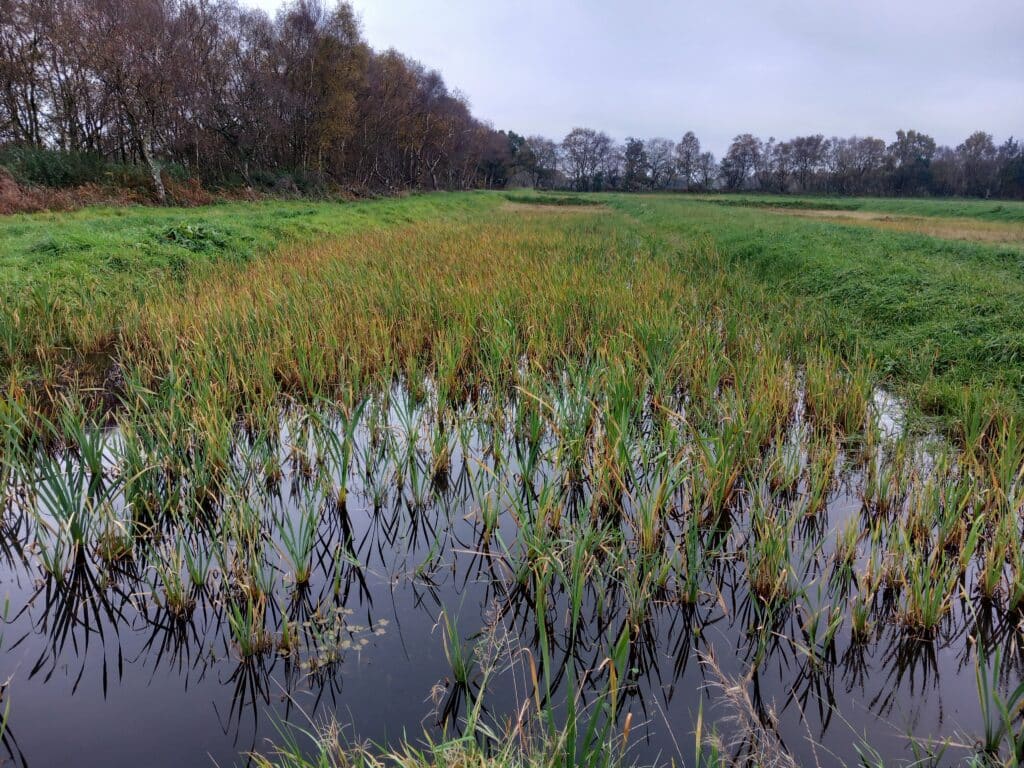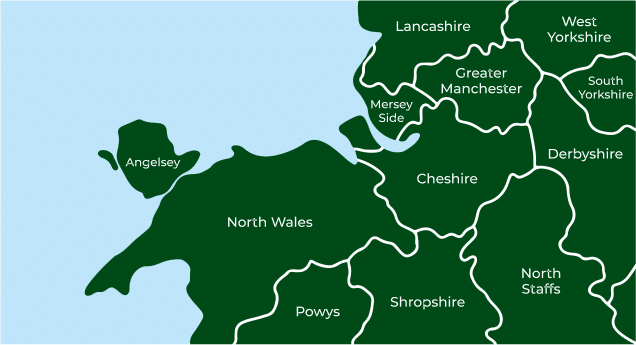Main Menu

A new €10m project is bringing together partners from the UK, Ireland and the Netherlands to develop a series of paludiculture demonstration sites to provide farmers with realistic and practical solutions of the sustainable farming of peatlands.
Paludiculture (also known as wetter farming) is the practice of restoring the naturally higher water table of peatlands which have previously been drained and converted to agricultural land, and then farming them in their newly re-wetted state. This helps to reduce the greenhouse gas emissions which are released when carbon rich peatlands are drained, but by developing ways to keep these areas farmed means that farmers and landowners keep an income stream. Rewetting also reduces subsidence and peat loss meaning the land remains productive into the future.
The Palus Demos paludiculture project:
Sarah Johnson, Head of Peatland Nature Recovery at Lancashire Wildlife Trust reported: In the UK over 80 per cent of our peatlands are damaged and the vast majority of our lowland peat has been drained and converted to agriculture. Much of this land is rapidly losing soil health and becoming difficult to farm, as well as releasing a staggering 3 per cent of our total UK greenhouse gas emissions. We know that by re-wetting previously drained peatland we can reduce these emissions by up to 90 per cent, but so many people’s livelihoods depend on this land that we need to find a way to keep them financially viable – this is where paludiculture comes in.
Celery: credit Jenny Bennion Lancashire Wildlife Trust
In the UK, across Lancashire, Manchester & North Merseyside paludiculture trials will be undertaken growing traditional food crops such as celery, lettuce and blueberries, along with novel crops including sphagnum moss which can be used to create peat-free compost, or bulrushes, the fluffy seed heads of which, can create BioPuff® a sustainable replacement to either synthetic fibres or goose down in padded jackets, whilst the fibrous stalks and leaves can be used to manufacture eco-friendly fibre board and even packaging for take away food.
Palus Demos co-ordinator Niall Ó Brolcháin, from the University of Galway, said: "It is great to take part in a European project that demonstrates new farming practices and should offer better incomes to farmers and rural communities while helping to reduce greenhouse gas emissions and improve the environment at the same time. We need to stop preaching at farmers while tying them up in red tape and to start presenting them with realistic, new, high value opportunities."
Dr Chris Field, Reader in Environmental Ecology at Manchester Metropolitan University and UK project lead, said “Palus Demos brings together partners from across multiple sectors including academia, business, farmers, Wildlife Trusts and government agencies. We’ll be working together to evidence the environmental benefits, develop growing techniques and produce the business cases that will support peatland farmers in moving to a more sustainable future”.
Giant drones are being used to sow bulrush seeds on re-wetted peatlands.
Dr Stephanie Evers, Reader in Wetland Ecology and Biogeochemistry at Liverpool John Moores University said: “These novel trials of wetter agricultural peat land management at scale will allow us to explore the potential for greenhouse gas reduction, soil and water pollution mitigation and even how rewetted peat soil may reduce landscape flooding. For decades, peatland farmers have drained and battled with flood prone fields only to suffer crop yield losses due to peat subsidence and climate change-altered weather. This project is an opportunity to value these areas for what they are and create sustainable agriculture to reduce emissions and help farmers to grow an exciting range of food and non-food crops.”
The fluffy seed heads of bulrushes can be used to create filling for padded jackets
Chris Evans, Senior Officer National Nature Reserves at Natural England, said: “We are pleased to be a UK partner in this important project which puts peatlands at its heart. Nature is absolutely critical for our infrastructure, health, economy and security. Using paludiculture is part of our longer-term vision and ambition for lowland peat landscapes. This work allows us to use Moss Side Farm as a centre for science and research, focussing on lowland peat management and restoration.”
The project brings together 26 international partners including farmers, public research bodies, NGOs, commercial farms and industry to stimulate the market and provide policy recommendations to address potential challenges. Partners include; BeadaMoss®, The Andersons Centre, The IUCN UK Peatland Programme, Lancashire Wildlife Trust, Liverpool John Moores University, Manchester Metropolitan University, Natural England, Ponda®, Wright Farm Produce, University of Galway, University of Amsterdam, Van Hall Larenstein University of Applied Sciences, University of Applied Science Utrecht, University College Dublin, Bórd na Móna, Forum Connemara and The Landscape Finance Lab.
Share this post
Follow us on Instagram

Sign up to our newsletter
Stay updated to the latest news and exclusive promotions right in your inbox.
Request a free monthly Farmart Magazine.

Request a free monthly Farmart Magazine.
